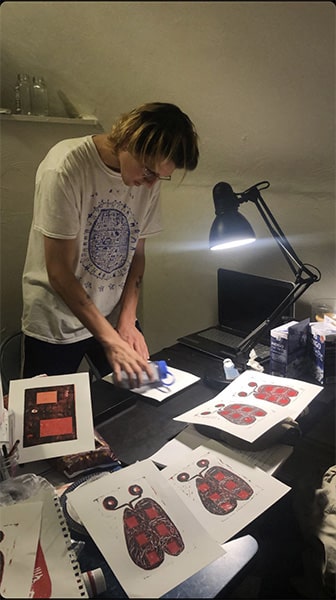SURF Student Translates East German Sci-Fi
Wilson Ekern opens the PDF copy of the 1984 East German collection of short science fiction stories "Windschiefe Geraden" on his laptop side-by-side with the translation he's been working on all summer. He stares at the line:
"Mein Arm", flüsterte Dart erneut, "der Computer hat meinen Arm gestohlen!"
With painstaking precision, he begins to translate. A page that might take one or two minutes to read can take anywhere from 30 minutes to an hour to translate. After reviewing the sentence several times, he arrives at his translation:
"My arm," Dart whispered again, "the Computer has stolen my arm!"
Ekern, a Carnegie Mellon University senior with a double major in technical writing and communication and German studies, received a Summer Undergraduate Research Fellowship from CMU's Undergraduate Research Office (URO) to work on translating four short stories from the collection, written by authors Angela and Karlheinz Steinmüller, under the direction of Gabriele Maier, an associate teaching professor of German in the Department of Modern Languages. After reviewing his own translated pages multiple times, he would send those pages to Maier who would offer her own revisions.
The idea of technology taking precedence over people is a common theme throughout the collection of stories. "Science fiction can be a mirror into the past. The themes and cultural attitudes of a time and place give rise to the genre. This has been a cultural translation as much as it is a straight translation into English," Ekern said.
While this wasn't Ekern's first foray into writing, it was his most ambitious. Ekern worked as a writer and managing editor for The Tartan, CMU's student newspaper.
"The Tartan really helped me learn how to develop ideas and get them on paper really fast," Ekern said. "It was valuable to have that experience outside the classroom. I wasn't getting a grade for it, but I was really focused on the quality of those pieces before they were published."
When he settled on his SURF project, Ekern reached out to the authors to secure permission to translate the works. He found the PDF version online and also purchased a vintage copy of the book. In the vein of original illustrations he found in the book, he also created an original linocut print, a type of printmaking where the artist carves his template into a piece of linoleum and applies ink to the template for prints, which he incorporated into a 10-copy run of published proofs of his translation.
"It's nice to be able to get the support from the URO for a project I've always wanted to do," Ekern said. "I got to think only about science fiction for an entire summer. Most of the stories are about characters using some crazy technological thing in a decaying former utopian project descending into chaos. It reflects the feelings of Germany in the '80s."
